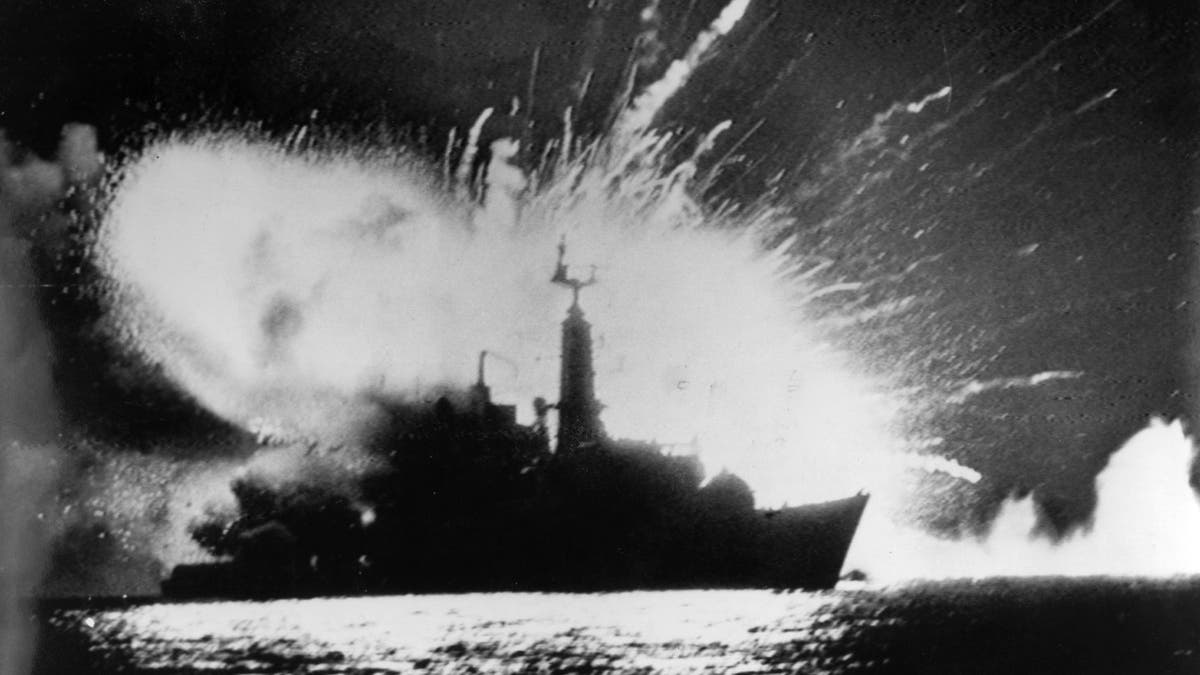
British Royal Navy frigate HMS Antelope explodes in the bay of San Carlos off East Falkland during the Falklands War. (Photo by Martin Cleaver/Pool/Getty Images)
Brazil helped supply Soviet weapons to Argentina, in deal negotiated by Cuba and supported by Libya, during the Falkland Islands War of 1982, according to a report by the Brazilian newspaper O Globo.
The scheme, first reported by the Rio de Janeiro daily, marks an unusual twist for Cold War-era politics as both the Argentine and Brazilian governments of the time were ruled by fervently anti-Communist military dictatorships.
The Argentine military junta, installed in 1976, had unleashed an internal war against Marxist and leftist political dissidents that eventually resulted in the deaths or disappearances of some 30,000 people, according to human rights groups.
But when Argentina’s generals found themselves embroiled in a conflict with United Kingdom over the islands the Argentines call the Malvinas and the British call the Falklands, it was the Soviet Union that offered military support.
Cuba emerged as the unlikely mediator of the deal. A week after Argentina invaded the Falklands on April 2, 1982, Cuba sent a diplomat Emilio Aragonés Navarro to Buenos Aires, via Brazil, to relay the message that the Soviets would send weapons and intelligence equipment to help the war effort against the British.
Brazil agreed to allow the weapons shipments to pass through its territory, O Globo reports, citing once-classified diplomatic and military documents released by the Brazilian government in recent weeks.
The shipments originated in Libya—then governed by Soviet ally Muammar al Qaddafi—and passed through the Brazil’s northeastern city of Recife, before continuing on to Buenos Aries, according to O Globo.
At their peak, two weapons flights passed through Brazil daily.
Though then U.K. Prime Minister Margaret Thatcher suspected Brazil of covertly facilitating arms shipments to Argentina, Brazil denied involvement and publicly maintained its neutrality.
The revelation by O Globo follows a release earlier this month of declassified U.S. documents requested by the National Security Archives that show the United States also played a greater role in the conflict than it had admitted.
The United States publicly declared neutrality at the outset of the three-month conflict, waiting until April 30 to announce its support for Britain.
In reality, however, the Reagan administration provided logistical and intelligence support to Britain from the beginning of the Argentine invasion.
The dispute over the islands continues to simmer.
The Falkland Islands are inhabited by some 3,000 people who identify as British subjects and are governed as an overseas British territory. Argentina claims sovereignty over the islands based on its inheritance of Spain's claim, though Argentina has never directly administered the Falklands since gaining its independence in the early 19th century.
Nevertheless, British rule over the islands angers most Argentines, who view England as an intruder and their possession of the Falklands as an unwelcome reminder of European colonialism.
Follow us on twitter.com/foxnewslatino
Like us at facebook.com/foxnewslatino








































